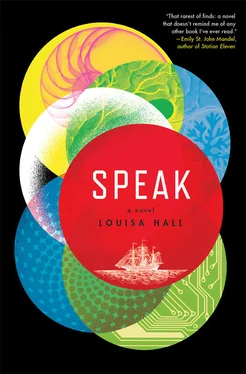I kept typing, a lump rising high in my throat. Finding your words, remembering what you said about me: You turned twenty. A young woman, no longer a girl, but you didn’t think of falling in love. By the time I typed those words I found I was crying. For you, for the young woman I was, for the marriage I fled. You took my hand and led me back to our bedroom, but to fall in love would have been a distraction. In the attic apartment where you were living, you trained her mind to be a museum. I accused myself of ignoring the one gift I was given. I accused myself of heartlessness, of pathological readiness to depart . You had to remember things right, so that when your family arrived, you could pick up where you’d left off. Instead of falling in love, you wrote letters.
My fingers on the keyboard were brutal. I could have gone on forever, but the receptionist in her goggles blinked the lights twice to let us know it was time to shut down. She snapped me back to my senses. Taking a deep breath, wiping the tears from my papery cheeks, I stopped where I was. Such sentimentality, ever since that documentary! I signed off for the evening. I picked up my straw hat, I collected myself, I gave the receptionist a neat smile, and I felt that I’d made a mistake .
Outside, I squelched home in my sneakers. It was dark out, well past nine o’clock. The runners were now home with their families, so I was alone on the trail. When I arrived at my building, I passed the doorman in the lobby that smells like a dentist’s office. In the elevator, there was a sign for HAPPY HOUR at a place called O’Donnell’s, with special prices for residents. My ears popped with the altitude change, and I thought to myself that this was no place for a woman my age .
I entered my empty apartment and took stock of the place: bare walls, books on the floor, two stools at the counter. I tried to go about my evening routines, to prevent myself from slipping into self-pity. I stood at my window. The horizon was checkered with spires of light, blinking telephone towers lining the ridges that block out the west. I looked over them all. What right, I asked myself, does a person with such a view have to such feelings? There’s an electric can-opener built into the wall. I have food in the pantry, I am alive .
From my unsociable stockpile, I chose a can of lentil soup, poured it like sewage into the pot, and stirred it with an old wooden spoon. Stirring, I felt myself settle. My thoughts became more distinct. It was one thing, I realized, to miss you after twenty years apart. But the woman I was when I was with you decided she’d rather be free than be a part of your story. One can only act in the moment. The bloodred rhomboidal shadows at your feet in that lecture hall, the didactic tone in your voice when you said things like “real world”: those caused revulsion to simmer in me. That revulsion was real, no less so now that I’m back in my modern apartment, longing for the home you could have provided .
Once the soup boiled, I turned it down and returned to my desk. So here I am: looking over my letter to you. Trying to maintain my rational mind-set. The truth is, if I were to fly to Germany on a whim, hop in a taxi and show up at your door, I’d probably want to leave as soon as I got there. First of all, your little wife would annoy me. I imagine her asking me questions about what it’s like to be a woman my age, me giving her exaggeratedly frightening answers about bone-density loss and living alone. With two women to impress, rather than one, you’d start holding forth, waving your confidence that takes up the whole room. I’d watch you, leaning forward in your excitement, wearing a sharp sweater over your shirt, and I’d remember the feeling of inhabiting your version of life. Of living on board a ship with you at the helm and nothing to do but stand at your shoulder. I’d remember the feeling of symbolizing suffering, and I’d do something insane like call a cab from the bathroom and leave without thanking your wife for the supper. I’d get on the first flight back to Boston. On my way home, I’d think to myself that bare walls aren’t so bad. They allow a person to think. I’d tell myself I’ll get a dog, name him Ralph, take him for walks. Work on my bone density. Have dinners with Toby, spend my mornings browsing the stacks, my afternoons talking with MARY. Telling her your story. Feeling less lonely for the company of your words, the attempt you made to knit me together .
I’m relieved enough to laugh at myself as I go check on the soup. It’s gotten cold, so I turn up the heat. I notice that the ring of flame from the burner casts a little reflection on my windows, and though I often take my view for granted, I’m struck with the enormity of the city below me, the multitude of lights, the knit and glitter of a metropolis fending off sleep .
I turn out the kitchen lights, extinguish the lamp on my desk, and go up to the glass to look out on the night. The bridges sparkle with electricity; cars pulse red down the highways. In the sky, the lights of airplanes weave between stars, and I almost feel I’m on board one, coming back from Germany, returning from your apartment. Without thinking, I lift my hand to wave through the window. I peer down below, hoping to find the single warm light that shines out of your perfect apartment. Goodbye, Karl, I think. Goodbye, my only husband. Have a good life and thank you. You led me back to our bedroom. You made me strong enough to depart .
Now I move among constellations, the same that Turing saw through Chris’s telescope, the same that sparkled above Mary’s ship. Now I’m not looking back any longer. From one star to the next I move away from the earth, alone in my spaceship, deeper into the darkness, until behind me the soup boils over and I draw myself back to make supper .
(1) The Memoirs of Stephen R. Chinn: Chapter 10
Texas State Correctional Institution, Texarkana; August 2040
After I learned of Dolores’s illness, I worked for another nine days, pausing only for brief stretches of sleep, never leaving the studio, eating bags of almonds and energy bars I’d stocked in the cabinet. I was completing MARY3’s voice, and I had to finish it quickly, so that I could focus on my struggling wife. Clearly, as a result of my distraction, I wasn’t understanding correctly. How could she not need me at her surgery? Had we decided against having more children? To grasp the whole situation, I had to wipe my mind clear. I couldn’t be thinking in codes when I took my wife’s hand and sat by her bedside. I couldn’t be distracted by snippets of Mary Bradford’s diary when I championed my wife through her illness.
For nine days I worked. On the tenth day I sent the finished program to be processed. The following day, via overnight mail, a prototype arrived and I presented it to Ramona. I showered hurriedly, shaved, put on a clean shirt, and delivered myself to Dolores, who was resting on the living room couch.
“I’m yours now,” I told her. “I’m sorry. I’m yours, now and forever. Tell me what I can do.”
“My name is Ella. What’s yours?” the doll said to Ramona, who had trailed me into the living room.
Dolores propped herself up on an elbow. “There are divorce papers on the desk,” she said. “Please sign them.”
“Hold on,” I said. “You’re not making sense. Let’s talk this through.”
“No talking,” Dolores said. “I’m sick of hearing you talk.”
“I want to be with you. You’ll need someone to help you through this process.”
“I’ve managed so far,” Dolores said.
“How old are you?” Ella asked Ramona.
Читать дальше












